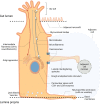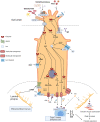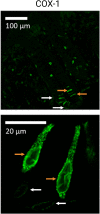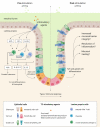Tuft Cells and Their Role in Intestinal Diseases
- PMID: 35237268
- PMCID: PMC8884241
- DOI: 10.3389/fimmu.2022.822867
Tuft Cells and Their Role in Intestinal Diseases
Abstract
The interests in intestinal epithelial tuft cells, their basic physiology, involvement in immune responses and relevance for gut diseases, have increased dramatically over the last fifteen years. A key discovery in 2016 of their close connection to helminthic and protozoan infection has further spurred the exploration of these rare chemosensory epithelial cells. Although very sparse in number, tuft cells are now known as important sentinels in the gastrointestinal tract as they monitor intestinal content using succinate as well as sweet and bitter taste receptors. Upon stimulation, tuft cells secrete a broad palette of effector molecules, including interleukin-25, prostaglandin E2 and D2, cysteinyl leukotriene C4, acetylcholine, thymic stromal lymphopoietin, and β-endorphins, some of which with immunomodulatory functions. Tuft cells have proven indispensable in anti-helminthic and anti-protozoan immunity. Most studies on tuft cells are based on murine experiments using double cortin-like kinase 1 (DCLK1) as a marker, while human intestinal tuft cells can be identified by their expression of the cyclooxygenase-1 enzyme. So far, only few studies have examined tuft cells in humans and their relation to gut disease. Here, we present an updated view on intestinal epithelial tuft cells, their physiology, immunological hub function, and their involvement in human disease. We close with a discussion on how tuft cells may have potential therapeutic value in a clinical context.
Keywords: Crohn’s disease; chemosensing; colorectal neoplasia; inflammation; inflammatory bowel disease; intestine; tuft cells; ulcerative colitis.
Copyright © 2022 Hendel, Kellermann, Hausmann, Bindslev, Jensen and Nielsen.
Conflict of interest statement
The authors declare that the research was conducted in the absence of any commercial or financial relationships that could be construed as a potential conflict of interest.
Figures




Similar articles
-
[Characteristics of intestinal tuft cells and their role in the pathomechanism of inflammatory bowel disease and colorectal carcinoma].Orv Hetil. 2023 Nov 5;164(44):1727-1735. doi: 10.1556/650.2023.32898. Print 2023 Nov 5. Orv Hetil. 2023. PMID: 37930381 Hungarian.
-
Dclk1 in tuft cells promotes inflammation-driven epithelial restitution and mitigates chronic colitis.Cell Death Differ. 2019 Sep;26(9):1656-1669. doi: 10.1038/s41418-018-0237-x. Epub 2018 Nov 26. Cell Death Differ. 2019. PMID: 30478383 Free PMC article.
-
MicroRNA-195 regulates Tuft cell function in the intestinal epithelium by altering translation of DCLK1.Am J Physiol Cell Physiol. 2021 Jun 1;320(6):C1042-C1054. doi: 10.1152/ajpcell.00597.2020. Epub 2021 Mar 31. Am J Physiol Cell Physiol. 2021. PMID: 33788631 Free PMC article.
-
Dclk1-expressing tuft cells: critical modulators of the intestinal niche?Am J Physiol Gastrointest Liver Physiol. 2017 Oct 1;313(4):G285-G299. doi: 10.1152/ajpgi.00073.2017. Epub 2017 Jul 6. Am J Physiol Gastrointest Liver Physiol. 2017. PMID: 28684459 Free PMC article. Review.
-
Regulation of immune responses by tuft cells.Nat Rev Immunol. 2019 Sep;19(9):584-593. doi: 10.1038/s41577-019-0176-x. Nat Rev Immunol. 2019. PMID: 31114038 Free PMC article. Review.
Cited by
-
Interaction between mitochondria and microbiota modulating cellular metabolism in inflammatory bowel disease.J Mol Med (Berl). 2023 Dec;101(12):1513-1526. doi: 10.1007/s00109-023-02381-w. Epub 2023 Oct 11. J Mol Med (Berl). 2023. PMID: 37819377 Free PMC article. Review.
-
Transit Amplifying Cells (TACs): a still not fully understood cell population.Front Bioeng Biotechnol. 2023 May 9;11:1189225. doi: 10.3389/fbioe.2023.1189225. eCollection 2023. Front Bioeng Biotechnol. 2023. PMID: 37229487 Free PMC article. Review.
-
Chronic arsenic exposure affects stromal cells and signaling in the small intestine in a sex-specific manner.Toxicol Sci. 2024 Mar 26;198(2):303-315. doi: 10.1093/toxsci/kfae016. Toxicol Sci. 2024. PMID: 38310360 Free PMC article.
-
Investigating the Crime Scene-Molecular Signatures in Inflammatory Bowel Disease.Int J Mol Sci. 2023 Jul 7;24(13):11217. doi: 10.3390/ijms241311217. Int J Mol Sci. 2023. PMID: 37446397 Free PMC article. Review.
-
Bitter taste receptors along the gastrointestinal tract: comparison between humans and rodents.Front Nutr. 2023 Aug 30;10:1215889. doi: 10.3389/fnut.2023.1215889. eCollection 2023. Front Nutr. 2023. PMID: 37712001 Free PMC article. Review.
References
Publication types
MeSH terms
Substances
LinkOut - more resources
Full Text Sources
Miscellaneous

